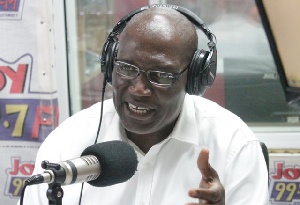 CEO of Dalex Finance, Ken Thompson
CEO of Dalex Finance, Ken Thompson
Government has been advised to check the country’s rising debt stock.
Chief Executive Officer (CEO) of Dalex Finance, Ken Thompson, who gave the advice recently in an interview with journalists in Accra, said government should invest in projects that would help lessen the debt burden of the country through investment into agriculture and other easy-to-recoup ventures instead of sinking more money into infrastructural developments that were not going to immediately yield dividends that would help reduce mounting debts.
Mr Thompson expressed misgiving about government’s capacity to address the issue of high public debt barely two months to elections to benefit the country’s economy.
As at August this year, Ghana’s total debt stock was GH¢110 billion, representing about 66 percent of Gross Domestic Product (GDP).
When the previous Kufuor administration was leaving office in 2008, the debt level was at GH¢9.5 billion. At the end of 2012, it was GH¢36 billion.
“At over 70 percent, our debt is considered to be unsustainable,” he noted, adding that the few projects embarked upon by government were long-term ones. “We are yet to see whether or not these projects will provide certain returns to pay off these debts.”
Investment in projects within the education sector and a few roads are not the same as investing in agriculture projects, Mr Thompson stated.
He therefore called on government to stop such investments since they do not guarantee immediate returns.
“I don’t believe building another 20 or 30 schools is what is going to give us that income to pay for the debt that we have right now,” he stressed. According to him, investments by government should revive the real sector of the economy which produces goods and services.
He added that agriculture sector, which would make Ghana competitive, deserved immediate consideration.
In recent times, Dr Mahamadu Bawumia, vice presidential candidate of the New Patriotic Party (NPP), has criticized government for contracting many loans and failing woefully to improve the lives of poor Ghanaians.